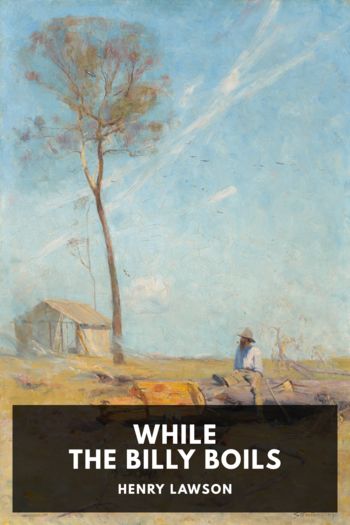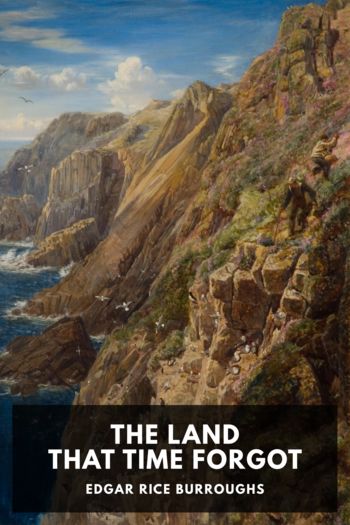While the Billy Boils, Henry Lawson [hardest books to read .txt] 📗

- Author: Henry Lawson
Book online «While the Billy Boils, Henry Lawson [hardest books to read .txt] 📗». Author Henry Lawson
“Get drunk?”
“No—you’re smart—for fear I’d clear. At last I swore on the Bible that I’d never leave home while the old folks were alive; and then mother seemed easier in her mind.”
He rolled the pup over and examined his feet. “I expect I’ll have to carry him a bit—his feet are sore. Well, he’s done pretty well this morning, and anyway he won’t drink so much when he’s carried.”
“You broke your promise about leaving home,” said his mate.
Mitchell stood up, stretched himself, and looked dolefully from his heavy swag to the wide, hot, shadeless cotton-bush plain ahead.
“Oh, yes,” he yawned, “I stopped at home for a week, and then they began to growl because I couldn’t get any work to do.”
The mate guffawed and Mitchell grinned. They shouldered the swags, with the pup on top of Mitchell’s, took up their billies and water-bags, turned their unshaven faces to the wide, hazy distance, and left the timber behind them.
In a Dry SeasonDraw a wire fence and a few ragged gums, and add some scattered sheep running away from the train. Then you’ll have the bush all along the New South Wales western line from Bathurst on.
The railway towns consist of a public house and a general store, with a square tank and a schoolhouse on piles in the nearer distance. The tank stands at the end of the school and is not many times smaller than the building itself. It is safe to call the pub “The Railway Hotel,” and the store “The Railway Stores,” with an s. A couple of patient, ungroomed hacks are probably standing outside the pub, while their masters are inside having a drink—several drinks. Also it’s safe to draw a sundowner sitting listlessly on a bench on the veranda, reading the Bulletin. The Railway Stores seem to exist only in the shadow of the pub, and it is impossible to conceive either as being independent of the other. There is sometimes a small, oblong weatherboard building—unpainted, and generally leaning in one of the eight possible directions, and perhaps with a twist in another—which, from its half-obliterated sign, seems to have started as a rival to the Railway Stores; but the shutters are up and the place empty.
The only town I saw that differed much from the above consisted of a box-bark humpy with a clay chimney, and a woman standing at the door throwing out the wash-up water.
By way of variety, the artist might make a watercolour sketch of a fettler’s tent on the line, with a billy hanging over the fire in front, and three fettlers standing round filling their pipes.
Slop sac suits, red faces, and old-fashioned, flat-brimmed hats, with wire round the brims, begin to drop into the train on the other side of Bathurst; and here and there a hat with three inches of crape round the crown, which perhaps signifies death in the family at some remote date, and perhaps doesn’t. Sometimes, I believe, it only means grease under the band. I notice that when a bushman puts crape round his hat he generally leaves it there till the hat wears out, or another friend dies. In the latter case, he buys a new piece of crape. This outward sign of bereavement usually has a jolly red face beneath it. Death is about the only cheerful thing in the bush.
We crossed the Macquarie—a narrow, muddy gutter with a dog swimming across, and three goats interested.
A little farther on we saw the first sundowner. He carried a Royal Alfred, and had a billy in one hand and a stick in the other. He was dressed in a tailcoat turned yellow, a print shirt, and a pair of moleskin trousers, with big square calico patches on the knees; and his old straw hat was covered with calico. Suddenly he slipped his swag, dropped his billy, and ran forward, boldly flourishing the stick. I thought that he was mad, and was about to attack the train, but he wasn’t; he was only killing a snake. I didn’t have time to see whether he cooked the snake or not—perhaps he only thought of Adam.
Somebody told me that the country was very dry on the other side of Nevertire. It is. I wouldn’t like to sit down on it anywhere. The least horrible spot in the bush, in a dry season, is where the bush isn’t—where it has been cleared away and a green crop is trying to grow. They talk of settling people on the land! Better settle in it. I’d rather settle on the water; at least, until some gigantic system of irrigation is perfected in the West.
Along about Byrock we saw the first shearers. They dress like the unemployed, but differ from that body in their looks of independence. They sat on trucks and wool-bales and the fence, watching the train, and hailed Bill, and Jim, and Tom, and asked how those individuals were getting on.
Here we came across soft felt hats with straps round the crowns, and full-bearded faces under them. Also a splendid-looking black tracker in a masher uniform and a pair of Wellington boots.
One or two square-cuts and stand-up collars struggle dismally through to the bitter end. Often a member of the unemployed starts cheerfully out, with a letter from the Government Labour Bureau in his pocket, and nothing else. He has an idea that the station where he has the job will be within easy walking distance of Bourke. Perhaps he thinks there’ll be a cart or a buggy waiting for him. He travels for a night and day without a bite to eat, and, on arrival, he finds that the station is eighty or a hundred miles away. Then he has to explain matters to a publican and a coach-driver. God bless the publican and the





Comments (0)